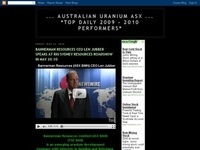Published on Thursday December 15 2011 (AEST)


Central to Areva’s financial woes is a provision for an asset write-down of US$1,97 billion for property and equipment at its UraMin operations, which include Trekoppje as well as Bakouma in the Central African Republic and Ryst Kuil in South Africa.
In addition, state-owned Areva slashed its uranium resource estimates at Trekkopje by nearly 42 per cent.
Oursel also announced an investigation into the 2007 UraMin deal, which cost Areva US$2,5 billion. French Industry Minister Eric Besson on Monday UraMin was “bought at a very high [cost] level”.
The Financial Post yesterday quoted David Talbot, an analyst at Dundee Capital Markets, saying that Areva bought UraMin before there were any significant metallurgical studies on the Trekkopje asset.
“They were reaching for pounds in the ground,” he said. “That deposit just doesn’t work the way they expected.”
In his presentation, Oursel said Areva has decided “to postpone the start of the three mining production projects stemming from the acquisition of UraMin”.
Trekkopje was expected to reach full capacity next year, producing 3 000 tonnes of uranium a year. In February this year, however, Areva said full production would be delayed until 2013, because of the “complexity” of the project.
By the time of going to press yesterday, Areva Processing Namibia could not tell The Namibian what the exact implications of Oursel’s announcement for Trekkopje would be.
Well-placed sources however dispelled rumours that Areva would be pulling out of Namibia.
When the company bought UraMin fours years ago, spot uranium prices were at a record height of US$135 per pound. Now it trades in the range of US$50 to US$55 per pound.
It is not just the UraMin outfit that will be hit by Areva’s turnaround plan, called ‘Action 2016’.
The company’s investment freeze also includes shelving a controversial nuclear enrichment plant project in Idaho in the US. Areva would cut its total investments by 34 per cent over the 2012-16 period, compared to the period 2007-11, Oursel said.
The company also plans to cut up to 1 500 jobs in Germany, and has instated a hiring freeze on support jobs like information technology in France.
 Australian Uranium News - Research
Australian Uranium News - Research


No comments:
Post a Comment